
In a dramatic turn of events at Cardiff Crown Court, a man accused of murdering convicted paedophile and former Lostprophets frontman Ian Watkins has refused to attend his hearing, forcing proceedings to be abruptly halted.
Leonard Gwynn, the 48-year-old defendant, remained in his prison cell despite being scheduled to appear before Judge Tracey Lloyd-Clarke for a plea and trial preparation hearing. The court heard that Gwynn had "declined to leave the prison," creating significant disruption to the high-profile case.
Violent Prison Incident
The charges stem from a violent incident at HMP Wakefield on August 6, 2024, where Watkins was found with fatal injuries. The disgraced musician, who was serving a 29-year sentence for horrific sex offences against infants, was pronounced dead at the scene.
Prosecutor John Hipkin revealed to the court that the situation had created "obvious difficulties" in moving the case forward. The hearing, which was expected to address crucial procedural matters, instead focused on the defendant's unexpected refusal to participate.
Legal Proceedings Stalled
Defence barrister Peter Hunter confirmed his client's absence, stating Gwynn had made the decision not to come to court from HMP Manchester, where he is currently being held. The development has thrown the legal timetable into disarray, with Judge Lloyd-Clarke expressing concern about the impact on the case's progression.
"This is a serious matter that requires the defendant's participation," the judge remarked, adjourning the hearing until October 25th. She emphasised that Gwynn would be expected to attend the next session, whether in person or potentially via video link.
Notorious Background
Ian Watkins, once the frontman of successful Welsh rock band Lostprophets, had been serving a 35-year sentence - reduced to 29 years on appeal - for what a judge described as "unimaginable degradation" involving infants. His crimes had shocked the nation and devastated the band's fanbase.
The case continues to attract significant public attention, both due to Watkins' notoriety and the circumstances surrounding his death in prison. The adjournment represents another chapter in the ongoing legal saga that began with Watkins' original conviction in 2013.





